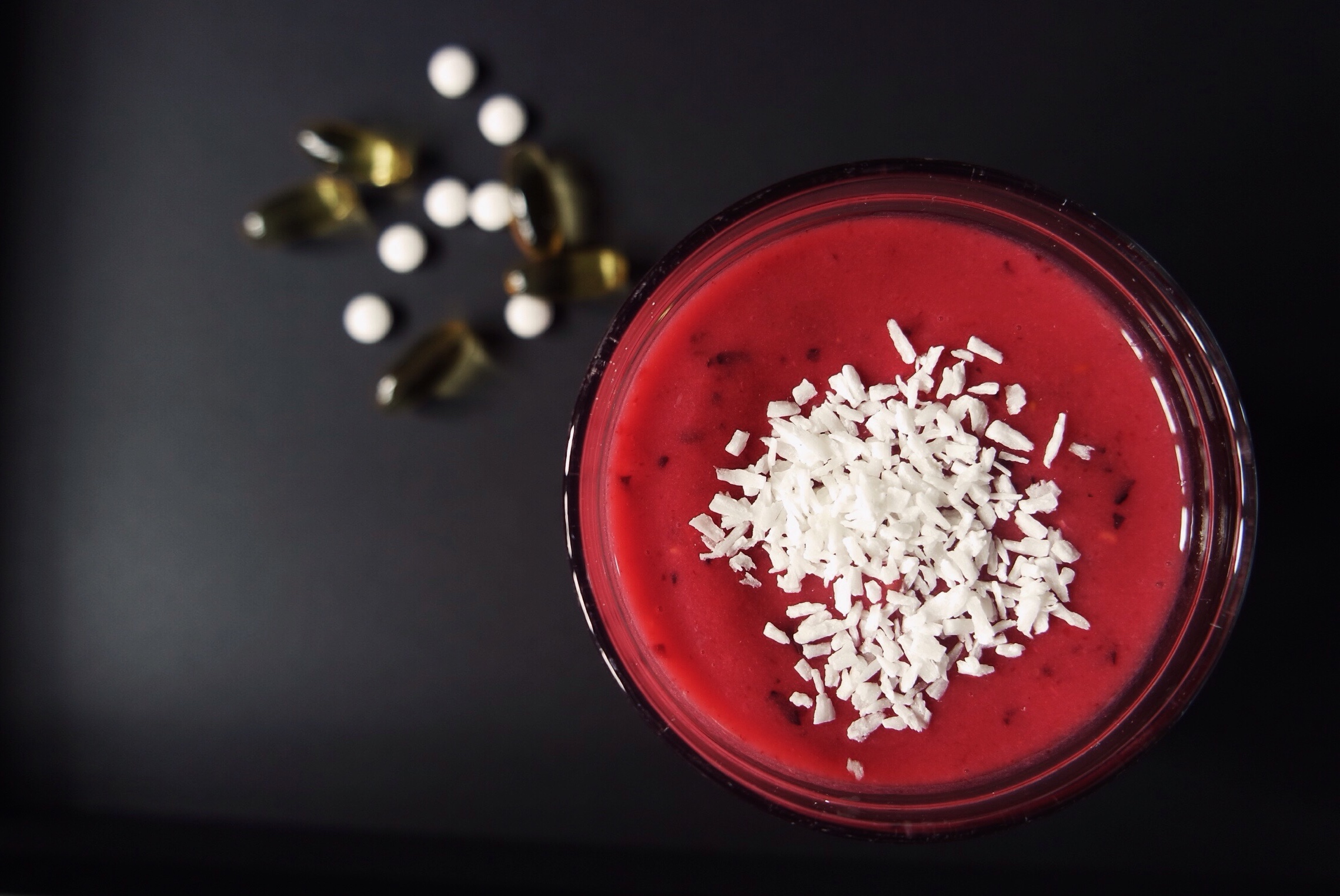THE SKINCARE DIET
Over the last couple of weeks I've shared some of the skincare products which I've found most helpful in dealing with hormonal acne [see here and here]. At the end of the day however, as the cause of hormonal acne comes from within, the solution also stems from an inside-out approach. Good skincare practice can only do so much, and succeeds mainly in dealing with the after-effects [under-skin blemishes, redness, scarring, etc] so a lot can be said for making a few dietary tweaks here and there.
Hormonal acne is caused by an imbalance of hormones, which can happen to anybody at any point in their life, and can be triggered by a number of stimuli, from stress to diet, birth control, and medication. It effects different people in different ways; for example, many women will experience hormonal acne whilst on the Pill whereas others will only experience it after coming off the Pill. Some women won't experience it at all, others might find it effects them later in life, or during and after pregnancy; either way it's as a result of imbalanced hormones.
Typically consisting of large, painful, cystic blemishes across the cheeks, jawline, and chin, hormonal acne often flares up when you're on your period as your hormones are changing. Essentially the imbalance lies in an excess of testosterone [which is why breakouts are typically found on the jawline - shadowing male facial hair]. If referred to a dermatologist there are a number of medications which serve to balance the hormones; increasing oestrogen or decreasing the production of testosterone. I personally have never taken acne medication so I won't be discussing it in this post, but if you have, please share your experiences in the comments!
EAT There's a lot of conversation re. the correlation between cow's milk and hormonal acne [the hormones within cow's milk can aggravate acne and cause inflammation]. From personal experience, cutting dairy is no mean feat, especially if you have a deep love for two guys named Ben and Jerry, and have grown up pouring milk on your cereal/in your tea your entire life. Those who wish to eliminate every last drop of dairy from their diet will realise very soon that pretty much everything contains a trace of dairy somewhere. Whilst your local supermarket will host plenty of dairy-free alternatives, it can still be a difficult, expensive, and restrictive process.
For this reason I decided to cut dairy only so far as it wasn't hugely impacting my buying/eating habits. I've cut out all forms of what I've labelled 'pure dairy', so cheese, butter, cream, yogurt, and of course milk itself. I've then cut down on foodstuffs which contains fairly high dairy counts, e.g. cakes, chocolate, etc. Swapping out milk chocolate for dark, occasionally buying a dairy-free slab, or opting to snack on nuts [almonds are especially good for the skin] or a health bar when I'm feeling peckish has helped here, and has also meant that I've been eating less sugar [which has probably helped my skin as well]. I've found that having the occasional "cheat day" [i.e. succumbing to ice cream/carbonara] hasn't caused any sudden flare ups, but if I do allow myself more than one such day in a row then it does show in my skin.
In terms of dairy-free options, Sainsbury's have a really good 'free from' range, which is usually pretty extensive even in small stores. The have barely indistinguishable alternatives to everything from jam tarts to chocolate spread. The brand Alpro [stocked in most supermarkets] makes affordable soy alternatives to dairy items such as yogurts and desserts [the dark chocolate ones are seriously good]. They also have some non-soya alternatives such as chocolate almond milk and coconut yogurt. I've yet to find a substitute for cheese, but I did eat a dairy free pizza the other day [at Dough in Manchester] so there must be something out there!
DRINK Milk-wise my preferred substitute is almond milk. It has a slightly nutty scent but this doesn't really translate into the flavour when used in tea or over cereal. Oat milk isn't so subtle, but unsurprisingly tastes fine in porridge! When eating out, almond milk doesn't tend to be an option, but most places offer soy milk as an alternative to dairy. Alpro also make chocolate and strawberry milks with almond and soy, which are actually pretty tasty but do contain a lot of sugar. I've been picking up the M&S version which is a little more nutritionally virtuous.
I've cut out my morning coffee [caffeine is a known inflammatory] but I find that the occasional latte when I'm out and about doesn't do any harm. Instead I've been drinking a lot of green tea [a powerful anti-inflammatory]. I've always found that my skin is a lot clearer when I'm drinking a couple of cups of green tea a day so I can't recommend it enough. If you find the taste a little insulting, buy the lemon infused option and add a teaspoon of honey or agave nectar - it makes a world of difference.
On a similar note, my skin looks and feels a lot healthier when I'm drinking a good amount of water. You've heard it all before so I won't elaborate here, but I do find that I drink a lot more water when I'm drinking through a straw [just me??] so this bottle never leaves my side when I'm spending the day at my desk.
I also recently invested in a Breville Blend-Active, which allows you to make a single serving smoothie/juice in the bottle, pop a lid on and go. It's so quick and easy to use [and clean!] that I've been making and drinking smoothies on an almost daily basis. I can't say that this in itself has had a profound effect upon my skin but it's certainly contributing towards my overall health!
SUPPLEMENT I didn't want to go too supplement crazy all at once, but I've been taking two of the 'big guns' of the supplement world when it comes to skincare; Omega-3 capsules and Zinc tablets. You can find both in Boots and they're nearly always on a 3 for 2 offer. Omega-3 contains fatty acids which maintain and repair damaged cells, and also have very powerful anti-inflammatory effects - even calming the effects of eczema and psoriasis. Similarly, zinc helps to repair and heal damaged tissue, prevent inflammation, control sebum production, and also helps to balance hormones.
It's been almost three months since I adopted a more mindful approach to my diet and within the last couple of weeks the effects have really started to show. Breakouts are now few and far between, and tend to be the occasional one-off blemish rather than the angry red patches which I was previously suffering from. My main concern now lies in clearing up the redness and marks left behind, but between a carefully tailored skincare routine and the supplements I'm already seeing a difference. It's important to remember that you're never going to see effects straight away but that patience and perseverance is key!
Please do share your skincare diet tips below!
G
To stay updated on future posts you can follow me on Twitter, Instagram, Facebook, and Bloglovin.

